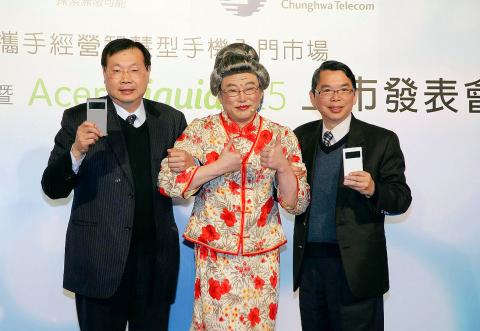Acer Inc (宏碁), the world’s fourth-largest PC maker, yesterday said it plans to launch wearable devices later this year, jumping on the bandwagon of popular mobile devices.
“We actually had demonstrated our products [wearable devices] to some of the company’s clients at the Consumer Electronics Show earlier this month,” said Peter Shieh (謝金全), vice president of Acer’s corporate account business division under the company’s Greater China regional operation department.
“The company is still developing certain types of wearable devices. We certainly aim to play a role in the new market,” he told reporters on the sidelines of a product launch event.

Photo: CNA
He did not said if the wearable products would include smart watches. In collaboration with telecom carrier Chunghwa Telecom Co (中華電信), Acer yesterday launched its new smartphone product, called the Liquid Z5, in Taipei. The new smartphone runs on Google Inc’s Android 4.2 Jelly Bean mobile operating platform and is equipped with MediaTek Inc’s (聯發科) MT 6572 1.3 GHz dual-core processor, a 5-inch display and 5 megapixel camera.
Shieh said Acer also planned to launch smartphones supporting 4G this year to meet consumers’ needs for faster wireless data transmission. He added that Acer will consider collaborating with the nations’ top three telecom carriers — Chunghwa Telecom, Taiwan Mobile Co (台灣大哥大) and Far EasTone Telecommunications Co (遠傳電信) — to help boost sales of its smartphones this year. Acer plans to sell between 140,000 and 175,000 smartphones in the home market this year, Shieh said.
That is between 100 percent and 150 percent more than 70,000 units of smartphones Acer sold in Taiwan last year, he added.
According to Acer’s internal financial report, up to 90 percent of the company’s smartphone sales were generated from telecom carriers’ purchases last year, Shieh said, forecasting that the percentage would remain the same this year.
“Given telecom carriers’ extensive sales channels, Acer has to collaborate with operators to sell its smartphone products in Taiwan and other countries as well,” Fubon Securities Co (富邦證券) analyst Ange Wu (吳淵傑) said by telephone.
Wu said Acer, like its largest domestic rival, Asustek Computer Inc (華碩), can make profits of between 20 and 30 percent of each smartphone’s sales price by selling smartphones to telecom carriers.
However, unlike China’s Lenovo Group (聯想), the world’s biggest PC maker, Acer has to differentiate its products from others and build strong brand loyalty to stay competitive in the smartphone market because “Lenovo has a huge home market that Acer lacks,” Wu said.
Separately, in a filing to the Taiwan Stock Exchange, Acer yesterday said its former chairman and chief executive officer Wang Jeng-tang (王振堂) had resigned from the company’s board of directors before his term was to end in June.

Sweeping policy changes under US Secretary of Health and Human Services Robert F. Kennedy Jr are having a chilling effect on vaccine makers as anti-vaccine rhetoric has turned into concrete changes in inoculation schedules and recommendations, investors and executives said. The administration of US President Donald Trump has in the past year upended vaccine recommendations, with the country last month ending its longstanding guidance that all children receive inoculations against flu, hepatitis A and other diseases. The unprecedented changes have led to diminished vaccine usage, hurt the investment case for some biotechs, and created a drag that would likely dent revenues and

Global semiconductor stocks advanced yesterday, as comments by Nvidia Corp chief executive officer Jensen Huang (黃仁勳) at Davos, Switzerland, helped reinforce investor enthusiasm for artificial intelligence (AI). Samsung Electronics Co gained as much as 5 percent to an all-time high, helping drive South Korea’s benchmark KOSPI above 5,000 for the first time. That came after the Philadelphia Semiconductor Index rose more than 3 percent to a fresh record on Wednesday, with a boost from Nvidia. The gains came amid broad risk-on trade after US President Donald Trump withdrew his threat of tariffs on some European nations over backing for Greenland. Huang further

CULPRITS: Factors that affected the slip included falling global crude oil prices, wait-and-see consumer attitudes due to US tariffs and a different Lunar New Year holiday schedule Taiwan’s retail sales ended a nine-year growth streak last year, slipping 0.2 percent from a year earlier as uncertainty over US tariff policies affected demand for durable goods, data released on Friday by the Ministry of Economic Affairs showed. Last year’s retail sales totaled NT$4.84 trillion (US$153.27 billion), down about NT$9.5 billion, or 0.2 percent, from 2024. Despite the decline, the figure was still the second-highest annual sales total on record. Ministry statistics department deputy head Chen Yu-fang (陳玉芳) said sales of cars, motorcycles and related products, which accounted for 17.4 percent of total retail rales last year, fell NT$68.1 billion, or

Macronix International Co (旺宏), the world’s biggest NOR flash memory supplier, yesterday said it would spend NT$22 billion (US$699.1 million) on capacity expansion this year to increase its production of mid-to-low-density memory chips as the world’s major memorychip suppliers are phasing out the market. The company said its planned capital expenditures are about 11 times higher than the NT$1.8 billion it spent on new facilities and equipment last year. A majority of this year’s outlay would be allocated to step up capacity of multi-level cell (MLC) NAND flash memory chips, which are used in embedded multimedia cards (eMMC), a managed